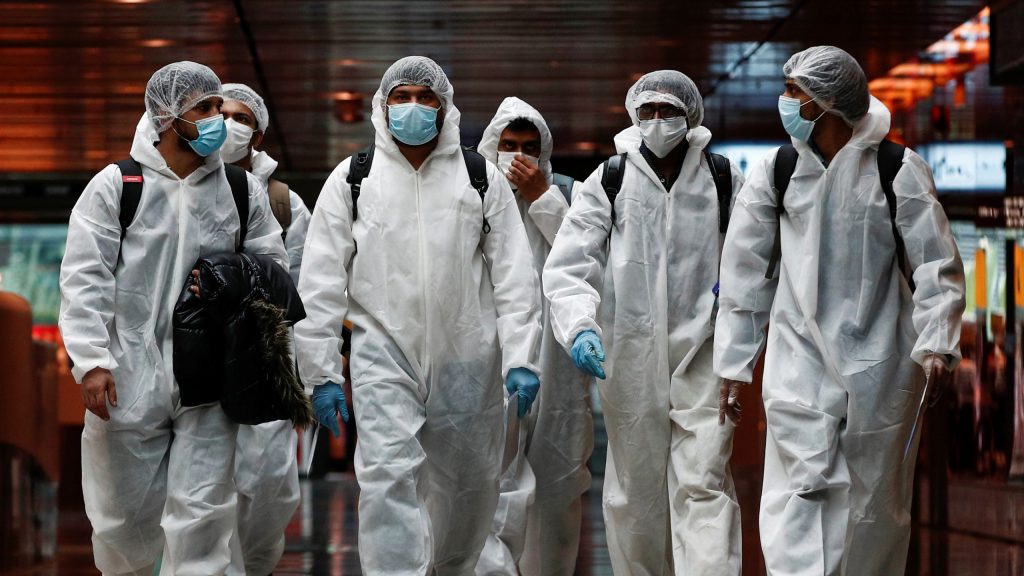Pope Francis sent special greetings to the 2 million seafarers around the world as part of marking Sea Sunday July 12.
After praying the Angelus with visitors to St. Peter's Square, the pope greeted with affection, "all those who work on the sea, especially those who are far from their loved ones and their country."
Sea Sunday is a day meant to remember and pray in a special way for the people who depend on the sea for their way of life, and, in general, it is celebrated the second Sunday of July.
However, because of the COVID-19 pandemic, some national associations of "Stella Maris" that work in the maritime apostolate have postponed the celebration.
The entire month of August still will be dedicated to "the maritime world" as part of Pope Francis' monthly intentions for 2020. The pope is asking that people pray for all those whose livelihoods depend on the sea, among them sailors, seafarers, fishers and their families.
The annual message for Sea Sunday and an accompanying prayer were released July 12 by the Dicastery for Promoting Integral Human Development.
In the message, Cardinal Peter Turkson, the dicastery's prefect, invited Catholics around the world to promise some form of solidarity and exercise a "preferential option" for poor seafarers.
An "unfailing commitment" to the well-being of seafarers "should be our attitude," he said in the written message.
Many of seafarers are poor, constantly exposed to danger or work in very difficult conditions to ensure the transport of essential and needed goods "for a healthy global economy," the cardinal said. And as such, they "really deserve our esteem and gratitude."
Echoing the words of the secretary-general of the International Maritime Organization, Kitack Lim, the cardinal told the world's seafarers, "You are not alone. You are not forgotten."
"Stella Maris" chaplains and volunteers are there, if not in person, then through its "virtual chaplaincy" on social media, "always ready to answer your call, to lend you a compassionate ear and praying for your wellbeing and the safety of your families," he wrote.
Chaplains and volunteers also will be continuing to work on their behalf, seeking to respond to their material and spiritual needs, giving voice to their concerns, upholding their labor and human rights and preventing discrimination, he added.
Cardinal Turkson dedicated much of the message to highlighting the many challenges, difficulties and injustices seafarers around the world already face and the added burdens caused by the COVID-19 pandemic.
For example, the shipping industry never shut down and it was an essential service in providing emergency, medical and other needed goods across the world.
The needed labor coupled with nationwide lockdowns meant some seafarers, "who had already spent between six to ten months on board, had to suffer the great inconvenience of having their employment period extended, with the consequent increase of personal fatigue and prolonged absence from loved ones and the comfort of homes."
He wrote it was estimated that each month some 100,000 seafarers who had gotten time off and were hoping to fly home were prevented from doing so because of border closings or flight cancellations.
Thousands of seafarers who were ready to begin a new contract "were stranded in hotels and dormitories around the globe, reduced to beggarly dependence on charitable institutions for their basic needs such as foods, toiletries, sim cards, etc. ...," he wrote.
With shore leave denied and restricted port entry for ships, "seafarers on board the vessels suffer isolation, severe physical and mental stress that brings many crews on the verge of desperation and, unfortunately, committing suicide." Those needing medical attention or care were also restricted from doing so "until they had to be carried on stretchers," he added.
"Despite the fundamental role that seafarers play for the global economy, a role whose great significance and need organizations and institutions tried to uphold during the COVID-19 crisis, current and prevailing legislation and policies simply glanced over them."
"That is why Sea Sunday is an opportunity for us to revisit the role of seafarers, and to recall some of the issues that negatively affect the seafarer's life and which are aggravated by the suspicion and fear" of workers being a source of infection, and to pray and offer concrete solidarity, he wrote.

